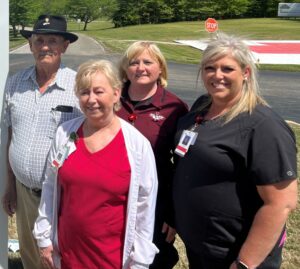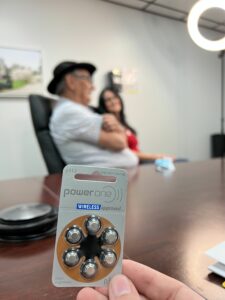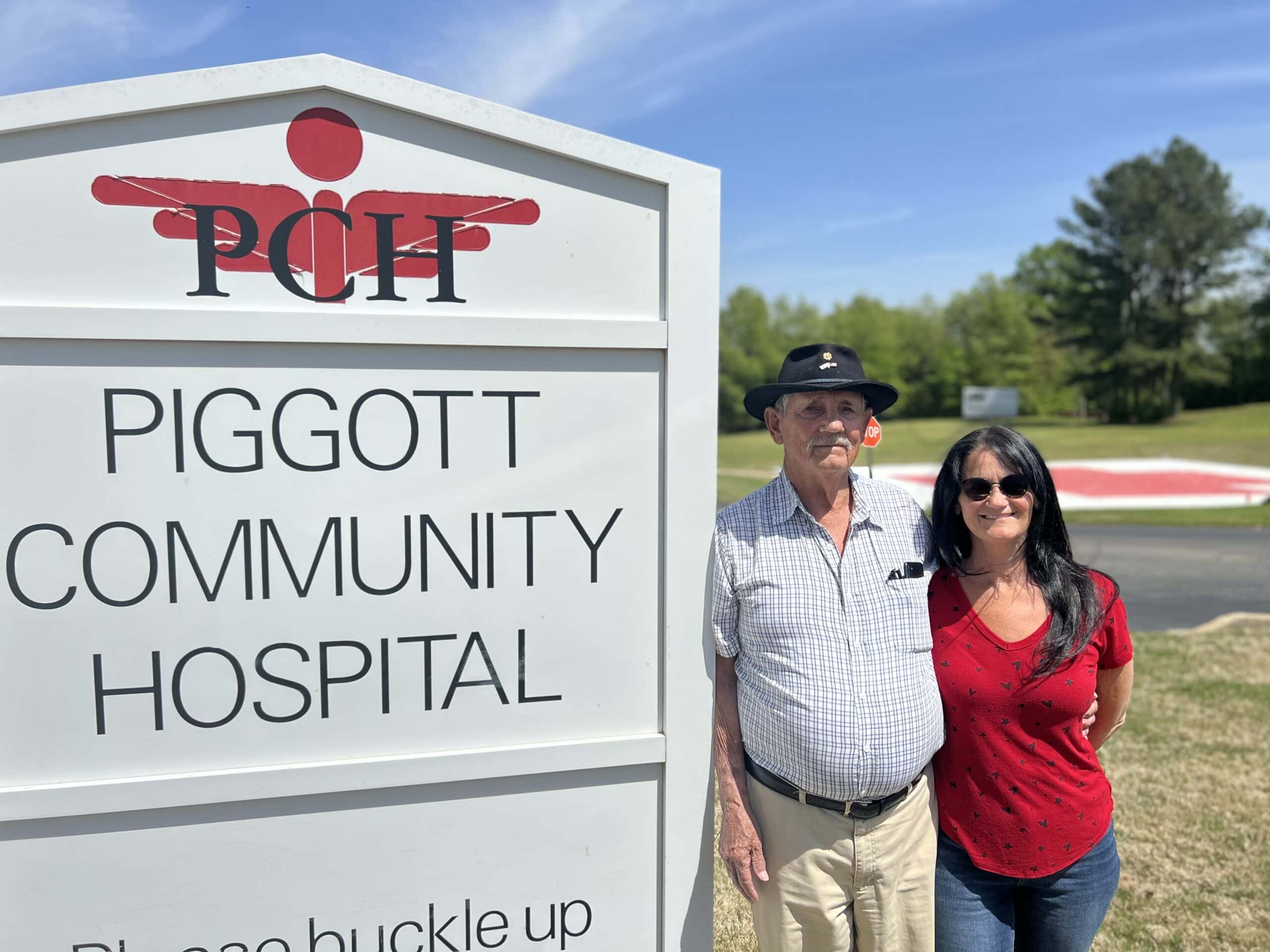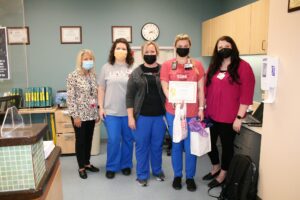Piggott Man Remembers “Everything” About Stroke, Including Caregivers’ Kindness
| Freddie Tate, 85, of Piggott, worked around helicopters during his time in the U.S. Air Force, but it wasn’t until March 5, 2021, when he suffered a stroke, that he rode in one for the first time.
“I spent four years in the Air Force and we had all kinds of helicopters, but I’d never been on a helicopter ride before,” Tate said.

Tate with members of the Piggott Community Hospital staff whose quick actions helped save his life. From left to right: Tammye Hendrix, Amy Gibson and Dalene Woods.Baylee Field
That day Tate, a father of four, woke from a nap and knew something was wrong. As a former assistant plant manager of a large factory, he was required to take a course in emergency first aid. Thanks to that course, he learned the signs of stroke: weakness or numbness on one side of the body, difficulty speaking or seeing, movement problems and loss of balance.
“From that [course], I knew when I had the stroke,” Tate said. “I got up, and I put my foot on the floor, and it wouldn’t hold up. Then I felt funny, and I put my hand [on the left side of my face], and I’m all [droopy] on the side of my head. I told my wife, ‘I’m having a stroke, we’ve got to call a doctor.’”
Just like the brain has two symmetrical lobes, it also has corresponding sets of arteries. The MCAs, or middle cerebral arteries, are by far the largest in the brain. They are also the most common artery involved in acute stroke. Tate’s stroke was in his right MCA.
Daughter Lynette Cale got a call from her mother and immediately drove over. They called the nearby veterans’ hospital and were told to immediately get to any emergency room. At home, they waited on an ambulance to transport Tate to Piggott Community Hospital.
“It’s a phone call you don’t want to get, that’s for sure,” Cale said. “I jumped in my truck and got there in less time than I’ve ever taken to get there. When I got there, [his condition] was more serious than I thought it was. It was pretty scary.”
At the hospital, Tate and his family consulted via live video with the UAMS stroke care team as part of the Institute for Digital Health & Innovation Stroke Program, formerly known as ARSAVES, which partners with 60 hospitals across the state.

Tate with members of the UAMS IDHI stroke team. From left to right: Olivia Wilson, Denetra Brown and Baylee Field.Baylee Field
“It’s amazing to know the changes, that we have this capability to interact with a neurologist in a bigger facility to get our patient to, versus what we did even 5-10 years ago,” said Tammye Hendrix, RN, EMS supervisor with Piggott Community Hospital. “Our goal is to work on whatever improvement we need to get them out the door to UAMS or another facility as quick as we can. Because we want to save the brain as much as we can.”
Prior to being transported to Little Rock by helicopter, Tate was given the option to receive alteplase, a clot-busting drug. In rare cases, the drug can cause brain bleeds in patients.
Sanjeeva Onteddu, M.D., the stroke program’s medical director, said that 94% of patients who receive alteplase experience no new deficits, and 32% of patients will see improvement. About 6% of patients experience bleeding complications, with 2% experiencing significant bleeding.
“Before they gave it to me they said, now this shot, it can kill you or it can save you — and it’s up to you whether we give it to you,” Tate said. “I said, ‘Don’t leave it up to me, leave it up to [my family],’ because I don’t want to be a burden to anybody. And they said ‘Give it to him.’”
“I thought that was amazing for him to be able [be diagnosed] right there, get a diagnosis and be able to get the medication — in time, because we were working on a time limit,” Cale said. “I thought it was awesome. All of the stuff he had to do, and they could see it in real time.”

UAMS nurse Caeley Rigdon brought Tate a new hearing aid battery. He returned the favor, sending a package of batteries to UAMS for other patients who need them.Baylee Field
With the drug beginning to work in his body, Tate was transported to UAMS, where he arrived two and a half hours after having a stroke. UAMS is one of only two comprehensive stroke centers in the state, which allows a level of expertise and care not available at other institutions. There, the stroke team regularly tested and evaluated Tate on his mental and physical readiness before he was discharged.
“Success stories like Mr. Tate’s are a wonderful testament to the high level of care and expertise offered by our stroke team,” said Marzella Backus, MNSc., RN, UAMS director of stroke services. “Arkansans have a higher rate of stroke than many states do. UAMS is dedicated to reducing stroke death and disability for Arkansans through the IDHI telestroke program and by maintaining the highest level of stroke care and certification available.”
Tate repeatedly thanked his caregivers in Piggott and at UAMS for saving his life.
“They didn’t quit,” Tate said. “When I got there, they started in on me, and they didn’t quit until I was gone out the door. Bless your hearts, I love you all. I don’t have the words to tell you how well I was treated down there. They just treated me like a king.”
He singled out one UAMS nurse, Caeley Rigdon, RN, BSN, who noticed that he needed a new hearing aid battery and was able to get him one the next day. She also brought him a charger for his phone, which he’d forgotten to bring in the rush. Tate sent a package of batteries to UAMS for patients who might need them.
“They gave me me the best care that you could ever think to have,” Tate said. “Best care I’ve ever had in a hospital was with UAMS.”
The stroke damaged part of Tate’s brain, and he still struggles sometimes, he said. He developed neuropathy, a condition resulting from damaged nerves, which caused pain in his knees and made him fall down. It took some time to regain the ability to walk. He also has occasional difficulty remembering things. His overall recovery, however, has been remarkable.
Tate’s advice to anyone experiencing or witnessing a stroke is to be fast.
“Don’t wait a second,” Tate said. “Get yourself to a hospital immediately.”
Tate’s caregivers are just as happy to see him doing well.
“I feel that we are truly blessed because we are a small hospital, a rural hospital, and we’re so many miles away from the bigger facilities,” Hendrix said. “So all of this has just been a blessing to improve the care of these people, and he’s proof.”

